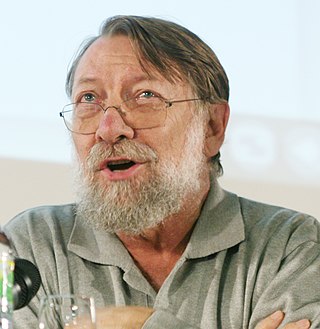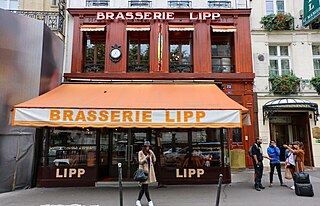Related Research Articles

Stéphane Courtois is a French historian and university professor, a director of research at the French National Centre for Scientific Research (CNRS), professor at the Catholic Institute of Higher Studies (ICES) in La Roche-sur-Yon, and director of a collection specialized in the history of communist movements and communist states.

Moissac is a commune in the Tarn-et-Garonne department in the Occitanie region in southern France. The town is situated at the confluence of the rivers Garonne and Tarn at the Canal de Garonne. Route nationale N113 was constructed through the town and between Valence-d'Agen and Castelsarrasin. It is served by Moissac station on the Bordeaux-Toulouse line.

The Watchfulness Committee of Antifascist Intellectuals was a French political organization created in March 1934, in the wake of the February 6, 1934 riots organized by far right leagues, which had led to the fall of the second Cartel des gauches government. Founded by Pierre Gérôme, philosopher Alain, physicist Paul Langevin and ethnologist Paul Rivet, it edited a newsletter, Vigilance, and boasted more than 6,000 members at the end of 1934.
The Cercle de l'Oratoire is a French think tank created a short time after the September 11, 2001 attacks. Since 2006, it edits a journal, Le Meilleur des mondes. The Circle is led by the journalist Michel Taubmann, who is also in charge of the news at Arte-Paris, and of his wife Florence, a pastor at the Temple de l'oratoire du Louvre and vice-president of the Amitié judéo-chrétienne group. Many of its members and the Meilleur des mondes journal supported the US invasion of Iraq, a minority viewpoint in France.

Thomas Gomart is a French historian of international relations and the director of IFRI since 2015. He was previously vice-president for strategic development at IFRI, and director of the Russia/NIS Center and of the trilingual electronic collection Russie.NEI.Visions in English.

Annie Kriegel, née Annie Becker was a French historian, a leading expert on communist studies and the history of Communism, a cofounder (1982) of the academic journal Communisme, and a columnist for Le Figaro.
Jean Oberlé was a French painter who became a member of the French Resistance.
Jean-François Berdah is associate professor at the Department of History at the University of Toulouse II - Le Mirail.
Louis Valentin, born Louis Valentine, was a French journalist, novelist, and screenwriter. He was born in Gap, Hautes-Alpes, and he lived in France until his death at Antibes.

Le Travailleur du Centre Ouest was a communist weekly newspaper published from Limoges, France. Le Travailleur du Centre Ouest was the regional organ of the French Communist Party in Limousin. It was founded as a continuation of the Communist Party newspaper in Corrèze, Le Travailleur de Corrèze, and the communist organs in Creuse and the Haute-Vienne.
Laird Boswell is Professor of History at the University of Wisconsin-Madison, specializing in the history of modern France. He was previous Assistant and then Associate Professor there, and before that, Instructor at the California Institute of Technology. He was visiting professor at Institut d’études politiques de Paris in 2008.

Brasserie Lipp is a brasserie located at 151 Boulevard Saint-Germain in the 6th arrondissement of Paris. It sponsors an annual literary prize, the Prix Cazes, named for a previous owner.
Maurice Tréand was a French communist leader who was responsible for vetting party members in the period leading up to World War II (1939–45). During the early part of the war, before the German invasion of the Soviet Union, he may have been indiscreet in discussions with the German occupiers of France. He was excluded from underground operations after the Communists became active in the French Resistance following the June 1941 German invasion of the Soviet Union.
Auxbrebis, originally also written as A Brebis when recognized as échevins (Alderman) and Patrician thereafter as aux Brebis, is an old noble family name. The name has been attested as early as in the thirteenth century. They are illustrated as originating from the city of Dinant as merchants and copper beaters.
Alexandra Laignel-Lavastine is a French philosopher, essayist, and historian of East European history and culture.
Events in the year 1861 in Belgium.
Events in the year 1848 in Belgium.
Jean Schalit was a French journalist.
Dionys Mascolo was a French literary editor, resistance fighter, left-wing political activist, author, and former husband of Marguerite Duras.
Femmes solidaires is a French feminist association in France, founded during the Second World War under the name Union des femmes françaises (UFF). The movement works for the defense and advancement of women's rights, gender equality, the liberal movement and international solidarity.
References
- ↑ Max Lagarrigue, Instructeurs et délégués du PCF (Instructors and delegates of the French Communist Party), Communisme n° 51-52, 1998; "Renaud Jean: iconoclaste ou l'enfant terrible du communisme (Iconoclast or the enfant terrible of communism), Communisme, n° 55-56, 1999.
- ↑ Yves Le Maner, Compte-rendu, revue Vingtième siècle, Sciences-Pop Paris, n°76, 2002.
- ↑ Jean-Pierre François, Quand Montauban vivait à l'heure des Belges, in La Dépêche du Midi, 28/4/2005; Marcel Leroy, Une Petite Belgique, Le Soir, 24 mars 2005.
- ↑ Les 50 qui font bouger Montauban, L'Express, 13 décembre 2004.